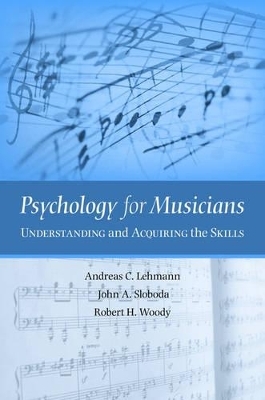
Psychology for Musicians
Understanding and Acquiring the Skills
Seiten
2007
Oxford University Press Inc (Verlag)
978-0-19-514610-3 (ISBN)
Oxford University Press Inc (Verlag)
978-0-19-514610-3 (ISBN)
Provides an introduction to psychological research for musicians - performers, music educators, and studio teachers. This work addresses the nature-nurture problem, identification and assessment of musical aptitude, musical development, adult skill maintenance, technical and expressive skills, practice, interpretation and expressivity, and more.
This book provides a concise, accessible, and up-to-date introduction to psychological research for musicians - performers, music educators, and studio teachers. Designed to address the needs and priorities of the performing musician rather than the research community, it reviews the relevant psychological research findings in relation to situations and issues faced by musicians, and draws out practical implications for the practice of teaching and performance. Rather than a list of DOs and DON'Ts, this book equips musicians with an understanding of the basic psychological principles that underlie music performcance, enabling each reader to apply the content flexibly to the task at hand.
Following a brief review of the scientific method as a way of thinking about the issues and problems in music, this text addresses the nature-nurture problem, identification and assessment of musical aptitude, musical development, adult skill maintenance, technical and expressive skills, practice, interpretation and expressivity, sight-reading, memorization, creativity, and composition, performance anxiety, critical listening, and teaching and learning. While there is a large body of empirical research regarding music, most musicians lack the scientific training to interpret these studies. This text bridges this gap by relating these skills to the musician's experiences, addressing their needs directly with non-technical language and practical application. The book includes multiple illustrations, brief music examples, cases, questions, and suggestions for further reading.
This book provides a concise, accessible, and up-to-date introduction to psychological research for musicians - performers, music educators, and studio teachers. Designed to address the needs and priorities of the performing musician rather than the research community, it reviews the relevant psychological research findings in relation to situations and issues faced by musicians, and draws out practical implications for the practice of teaching and performance. Rather than a list of DOs and DON'Ts, this book equips musicians with an understanding of the basic psychological principles that underlie music performcance, enabling each reader to apply the content flexibly to the task at hand.
Following a brief review of the scientific method as a way of thinking about the issues and problems in music, this text addresses the nature-nurture problem, identification and assessment of musical aptitude, musical development, adult skill maintenance, technical and expressive skills, practice, interpretation and expressivity, sight-reading, memorization, creativity, and composition, performance anxiety, critical listening, and teaching and learning. While there is a large body of empirical research regarding music, most musicians lack the scientific training to interpret these studies. This text bridges this gap by relating these skills to the musician's experiences, addressing their needs directly with non-technical language and practical application. The book includes multiple illustrations, brief music examples, cases, questions, and suggestions for further reading.
Andreas C. Lehmann is Professor of (Systematic) Musicology at the Hochschule für Musik in Würzburg, Germany. John Sloboda is Professor of Psychology at Keele University. A Fellow of the British Psychological Society, he has been President of both the Psychology and General Sections of the British Association for the Advancement of Science, as well as President of the European Society for the Cognitive Sciences of Music. Robert Woody is Associate Professor of Music Education at the University of Nebraska-Lincoln School of Music.
PART I: MUSICAL LEARNING; SECTION II: MUSICAL SKILLS; SECTION III: MUSICAL ROLES
| Erscheint lt. Verlag | 22.3.2007 |
|---|---|
| Zusatzinfo | 1 photograph, 29 line illustrations and 2 music examples |
| Verlagsort | New York |
| Sprache | englisch |
| Maße | 241 x 162 mm |
| Gewicht | 549 g |
| Themenwelt | Kunst / Musik / Theater ► Musik ► Musiktheorie / Musiklehre |
| Geisteswissenschaften ► Psychologie ► Entwicklungspsychologie | |
| ISBN-10 | 0-19-514610-7 / 0195146107 |
| ISBN-13 | 978-0-19-514610-3 / 9780195146103 |
| Zustand | Neuware |
| Haben Sie eine Frage zum Produkt? |
Mehr entdecken
aus dem Bereich
aus dem Bereich
Grundbegriffe, Harmonik, Formen, Instrumente
Buch | Softcover (2021)
Philipp Reclam (Verlag)
CHF 12,90
Jazz als Gegenkultur im westlichen Nachkriegsdeutschland
Buch | Hardcover (2024)
edition text + kritik (Verlag)
CHF 57,90


